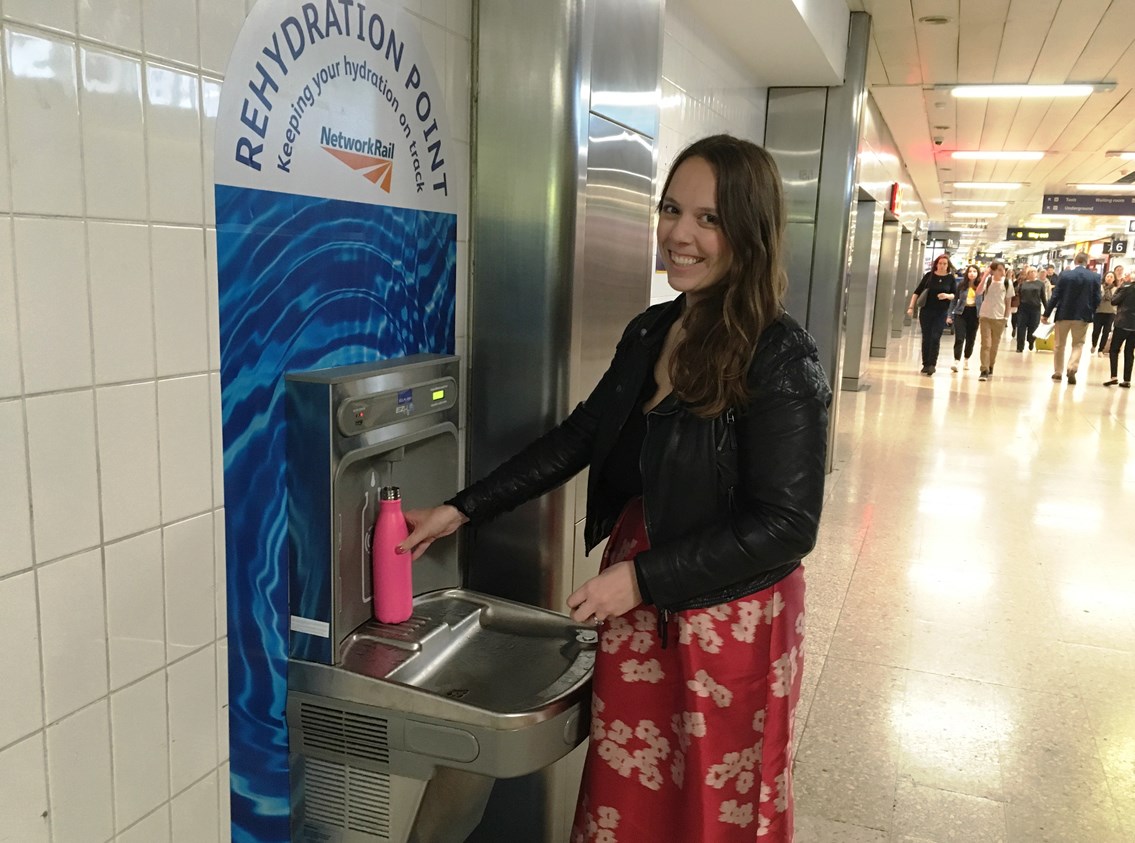Tuesday 25 Feb 2020
Passengers take on plastic pollution at Britain’s biggest and busiest stations
- Region & Route:
- National
- Three million plastic water bottles have been saved from landfill through the introduction of free drinking water fountains at stations
- Water fountains are now located in every Network Rail station
- Station water fountains can be found on City to Sea’s free Refill app
Passengers have helped save the equivalent of three million plastic bottles* from landfill with the introduction of free drinking water fountains at Network Rail’s biggest and busiest stations.
Since launching in 2018, the water fountain initiative has proven increasingly popular with passengers. During last year’s National Refill Day - an initiative led by City to Sea - Network Rail celebrated saving the equivalent of one million plastic bottles and set a target of reaching two million by the end of 2020. Passengers have already surpassed that goal by one million by making the switch to reusable bottles.
This success coincides with the final major station, Leeds, installing its water fountain last month as part of wider refurbishment works. Free water fountains can now be found at all 20 of Network Rail’s managed stations, including Waterloo, Birmingham New Street and King’s Cross.
With water fountains springing up across the UK, passengers are encouraged to download City to Sea’s Refill App. The app connects people to almost 30,000 Refill Stations nationwide, to help them reduce their use of single-use plastic on the move.
Steve Hynd, Campaigns Manager at City to Sea, said:
“It’s fantastic to have the support of Network Rail, and through our partnership with them we are empowering passengers to avoid single-use plastic. We know that when people are on the go, this is the time they’re most likely to buy a plastic bottle of water. Research shows 36% of people who regularly carry a reusable water bottle say they would buy a plastic bottle at a train station.[1] We are here to offer them an easy, cheap and good for the environment alternative. Now that’s something to raise a glass to”.
David Biggs, Managing Director Property, Network Rail, said:
“Network Rail has a big role to play in tackling plastic pollution. We know that passengers share our passion for reducing single use plastics, so it’s important that we make it as easy as possible for them to refill throughout their journey. It’s great that we now have free water fountains in all of our managed stations, and even more so, that they’re making a real difference for passengers.”
Transport Secretary Grant Shapps, said:
“Network Rail and City to Sea’s campaign has been a massive success, ensuring passengers stay hydrated, save money and we all save the planet one water bottle at a time.
“People across the country start and finish their days on our railways and encouraging water refills both avoids waste and means that, as a nation, we won’t be running on empty.”
* Measurement based on an average 23.5cm 500ml bottle.
[1]‘Water, Water, Everywhere. Moving from awareness to action on single-use plastic bottles’. April 2018. Keep Britain Tidy.
- City to Sea is an environmental not-for-profit campaigning to stop plastic pollution at source. Their award-winning campaigns are tackling the single-use plastic items found most commonly on our beaches and in our rivers and oceans by providing practical, solutions-focused initiatives and advocating reuse over single-use. City to Sea are behind the award-winning Refill Campaign, which is estimated to have prevented 100 million plastic bottles from entering our waste stream by 2019. With more than 30,000 Refill Stations and over 250,000 app downloads, City to Sea has proven that Refill has the power to create a tipping point in reducing plastic pollution at source. The campaign has grown phenomenally in the last 18 months and is now on track to launch internationally in 2020. For more information please visit refill.org.uk
- Network Rail’s directly managed stations
|
National stations |
London stations |
|
Birmingham New Street |
Cannon Street |
|
Bristol Temple Meads |
Charing Cross |
|
Edinburgh Waverley |
Euston |
|
Glasgow Central |
King’s Cross |
|
Leeds |
London Bridge |
|
Liverpool Lime Street |
Liverpool Street |
|
Manchester Piccadilly |
Paddington |
|
Reading |
St Pancras International (lower level) Retail at St Pancras is managed by HS1 |
|
Guildford |
Victoria |
|
Waterloo |
|
|
Clapham Junction |
- Background: Network Rail’s free drinking water initiative first launched in London Charing Cross in February 2018 to help tackle the global threat of plastic pollution by helping passengers avoid single-use plastic bottles.
Contact information
Passengers / community members
Network Rail national helpline
03457 11 41 41
Latest travel advice
Please visit National Rail Enquiries
Journalists
Jack Harvey
Jack.Harvey2@networkrail.co.uk
About Network Rail
We own, operate and develop Britain's railway infrastructure; that's 20,000 miles of track, 30,000 bridges, tunnels and viaducts and the thousands of signals, level crossings and stations. We run 20 of the UK's largest stations while all the others, over 2,500, are run by the country's train operating companies.
Usually, there are almost five million journeys made in the UK and over 600 freight trains run on the network. People depend on Britain's railway for their daily commute, to visit friends and loved ones and to get them home safe every day. Our role is to deliver a safe and reliable railway, so we carefully manage and deliver thousands of projects every year that form part of the multi-billion pound Railway Upgrade Plan, to grow and expand the nation's railway network to respond to the tremendous growth and demand the railway has experienced - a doubling of passenger journeys over the past 20 years.
Follow us on Twitter: @networkrail
Visit our online newsroom: www.networkrailmediacentre.co.uk

